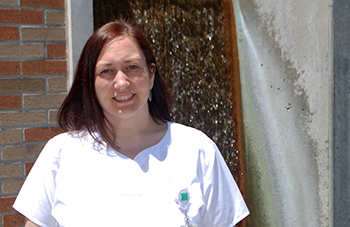
Spotlight on St. Joseph's Hospital wound/ostomy nurse specialist Wendy Walker
Wendy Walker, BSN, RN, CWOCN, CFCN
Wound/Ostomy Nurse Specialist, St. Joseph’s Hospital
Education: Bachelor of Science in Nursing from University of Arkansas for Medical Science; Wound, Ostomy, and Continence Nursing Education Center – Emory University
SJ/C: Why did you become a nurse?

Wendy: I wanted to be a nurse since high school. I enjoy helping people, and I feel like I can make a difference in someone's life, even if it is in a small way.
SJ/C: What do you love about being a nurse at St. Joseph’s/Candler?
Wendy: I love the collaborative feel of working here. Since I’m not assigned to a specific unit, I’m able to work with the excellent nurses and PCTs of every unit. I also work with the dietitians, PT and OT, case mangers, social works, et cetera.
SJ/C: What kind of patients do you typically work with?
Wendy: Basically anyone who comes in with a wound. At Candler, my teammates also can see pediatric patients and can see obstetric patients if necessary.
SJ/C: Why did you decide to get a specialty in Wound, Ostomy and Continence?
Wendy: The catalyst to becoming a wound/ostomy nurse was when I was a new grad RN, and I had a 92-year-old lady as a patient with a brand new ostomy. I didn't feel like I gave the care she deserved, and she definitely did not learn how to care for herself. A friend led me to information about becoming a CWOCN. I found the Emory program and enrolled as soon as I could. I decided that bedside nursing wasn't for me, but I enjoy the patient interaction. So being a CWOCN is the best of borth worlds. I get to help patients, and I also get to do a lot of education with patients, students, RNS and even our experienced nurses, especially when we roll out new products or techniques.
(An ostomy refers to a surgically created opening in the body for the discharge of body wastes.)
SJ/C: What is special about working in Wound and Ostomy?
Wendy: Ostomy patients are special. Some people come in to the hospital never dreaming they would leave with an ostomy. An ostomy can be a life saver – in more ways than one. It can literally save a person with a blockage or trauma to the bowel, but sometimes for patients with chronic bowel conditions, an ostomy is their way back to living a normal life. There is a stigma about having an ostomy or 'a bag.' I’d like to see that change. The CWOCN’s role with ostomy patients is to educate patients and/or their families on how to care for their ostomy prior to discharge. Ostomy patients should be able to live their lives, and do all the things they did prior to their surgery.
I love to watch the progression of a wound healing. It’s not often, but I’ve had a few patients come in with a wound and I’ve seen it heal prior to discharge. Most folks aren’t here that long, but even small improvements are interesting to see.
SJ/C: What is the most often-asked question you are asked as a nurse?
Wendy: ‘How long will this take to heal?’ There’s no way to give a definite answer in wound healing time. Healing is multifactorial. Smoking, diabetes, and nutrition are huge factors in wound healing time. Diabetics are notoriously slow healers; tight glucose control is essential. Smoking causes a vasoconstriction and that reduction of blood flow can hamper healing. Our great dietitians help supplement patient’s meals while they are in the hospital, but patients have to continue supplementing their diet once they’re home. Good nutrition is very important to wound healing.
SJ/C: What advice would you offer to new nurses or those considering a career in nursing?
Wendy: Nursing has such varied opportunities – try them out until you find your niche. You can use your nursing degree in hundreds of ways. Be prepared to work hard and ask questions.
Family: Husband of 20 years and one son in the eighth grade
Hobbies/Interest: Quilting and knitting
